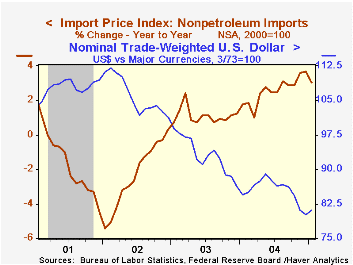 Global| Feb 17 2005
Global| Feb 17 2005Import Prices Higher With Petroleum, Non Oil Prices Easier
by:Tom Moeller
|in:Economy in Brief
Summary
Import prices rose 0.9% last month due to a surprising 4.6% spurt in petroleum prices. Consensus expectations had been for a 0.6% rise. Nonpetroleum prices, however, rose an easier 0.2% following a downwardly revised gain of 0.4% in [...]

Import prices rose 0.9% last month due to a surprising 4.6% spurt in petroleum prices. Consensus expectations had been for a 0.6% rise. Nonpetroleum prices, however, rose an easier 0.2% following a downwardly revised gain of 0.4% in December.
During the last ten years there has been a negative 55% correlation between the foreign exchange value of the dollar against major currencies and the y/y change in nonpetroleum import prices. There has been a negative 39% correlation between the broad trade weighted dollar index and prices.
Import pricing strength in January was pronounced for consumer goods less autos, up 0.4% (0.8% y/y). Capital goods prices rose a moderate 0.2% (-0.8% y/y) but that gain was held back by a 1.0% (-6.9% y/y) decline in computer prices. Excluding computers capital goods prices rose 0.8% (2.3% y/y), lifted by a 1.7% rise in prices for civilian aircraft. Motor vehicle and parts prices fell 0.1% (+1.6% y/y) and food & beverage prices fell 0.2% (+6.9% y/y).
Petroleum prices jumped 4.6%. The price of Brent crude oil rose to $43.55 in January and is up roughly another dollar this month.
Export prices rose 0.7% due to a 0.7% surge (5.1% y/y) in nonagricultural export prices.
| Import/Export Prices (NSA) | Jan | Dec | Y/Y | 2004 | 2003 | 2002 |
|---|---|---|---|---|---|---|
| Import - All Commodities | 0.9% | -1.4% | 6.0% | 5.6% | 2.9% | -2.5% |
| Petroleum | 4.6% | -11.5% | 26.9% | 30.4% | 21.0% | 3.0% |
| Non-petroleum | 0.2% | 0.4% | 3.0% | 2.6% | 1.1% | -2.4% |
| Export - All Commodities | 0.7% | 0.2% | 4.0% | 3.9% | 1.6% | -1.0% |
Tom Moeller
AuthorMore in Author Profile »Prior to joining Haver Analytics in 2000, Mr. Moeller worked as the Economist at Chancellor Capital Management from 1985 to 1999. There, he developed comprehensive economic forecasts and interpreted economic data for equity and fixed income portfolio managers. Also at Chancellor, Mr. Moeller worked as an equity analyst and was responsible for researching and rating companies in the economically sensitive automobile and housing industries for investment in Chancellor’s equity portfolio. Prior to joining Chancellor, Mr. Moeller was an Economist at Citibank from 1979 to 1984. He also analyzed pricing behavior in the metals industry for the Council on Wage and Price Stability in Washington, D.C. In 1999, Mr. Moeller received the award for most accurate forecast from the Forecasters' Club of New York. From 1990 to 1992 he was President of the New York Association for Business Economists. Mr. Moeller earned an M.B.A. in Finance from Fordham University, where he graduated in 1987. He holds a Bachelor of Arts in Economics from George Washington University.
More Economy in Brief
 Global| Feb 05 2026
Global| Feb 05 2026Charts of the Week: Balanced Policy, Resilient Data and AI Narratives
by:Andrew Cates






